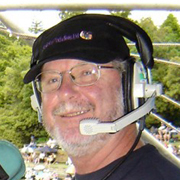
Geoff Clements
Nicknamed 'The General', veteran sports cameraman Geoff Clements spent over half a century capturing sport events on-screen. A keen cricketer, he took his first spin behind the lens in 1966 at Lancaster Park in Christchurch, covering a warm up match between Canterbury and the Australian XI. Clements manned one of three cameras (a meagre number by modern standards) covering the match that day, which was broadcast to a radius of roughly 50 kilometres around the city.
Lancaster Park would be the chief location for Clements' career. As friend and colleague Richard Hansen put it, "Lancaster Park was Geoff’s theatre, it was the stage he could utilise to take his work to the world".
Clements was soon employed to shoot many sporting events from behind the ball-follow camera. Though it was a challenging role, Clements' love and personal experience of the sporting world, especially in cricket, was a vital help. As he told Cricinfo reporter Firdose Moonda, "to do any sport, you’ve got to be able to know the game. If you’ve played the game at any level, you get to understand the parabola of the situation and how a batsman shapes to play the ball and where it’s going to go."
Though Clements had a great fondness of covering sport, he occasionally used his force behind the lens to cover arts events, again, mainly in Christchurch. 1978 saw the arrival of The Beach Boys, in which Clements worked the concert, as well as 1979's Mobil Song Quest and the Pacific Song Contest. He also worked on Christchurchs' own music show Popco and regional magazine series The South Tonight.
Also working in children’s television, Clements manned the camera for shows such as long running series What Now from 1998 until 1999, and Jason Gunn's Bumble and Bumblettes. Gunn has spoken of how he owed his ability to overcome his nervousness as a teenager on screen to Clements, who helped Gunn talk to the nation by his manner and ideas. Between 1998 and 2000, Clements worked on the first three seasons of children’s story telling series The Big Chair, simultaneously continuing his sports coverage.
George Smith, a colleague of Clements, said he was "an inspiration for those coming into the role." In 2010 was awarded the Queens Service Medal for his services to the television industry. Between his first ever match at Lancaster Park and 2010, Clements had worked on 114 test cricket matches and 210 one-day international cricket games.
Not only did Clements play a large part in enabling Kiwi’s around the country to get their sports fix, he also spent his time mentoring aspiring camera operators and coaching the Canterbury Women’s Bowls team.
In 2017, after celebrating over half a century in the industry, Clements decided to put down the camera and retire. A Beatles fan, Clements told ESPN, "as George Harrison, the great Beatle, wrote; 'all things must pass...' and I think that's a fair thing." Karla Underwood, a colleague he mentored would take over his role.
On 7 October 2019, Clements died at his Christchurch home at the age of 72. Clements was described as a 'father figure' for Kiwi camera operators.
Profile published on 29 April 2022
Sources include
Geoff Longley, 'Life Story: Geoff Clements' world behind the sports lens' Stuff website. Loaded 2 November 2019. Accessed 29 April 2022
Firdose Moonda, 'Like gardening on speed' (Interview) ESPNcricinfo website. Loaded 13 March 2017. Accessed 29 April 2022
Adrian Seconi, 'Time to watch from a comfortable seat' (Interview) - The Otago Daily Times, 28 March 2022
'Lancaster Park: The crown jewel of Christchurch', New Zealand Broadcasting School website. Accessed 29 April 2022
Ngā Taonga Sound & Vision website
'Geoffrey Clements' The Press, 9 October 2019